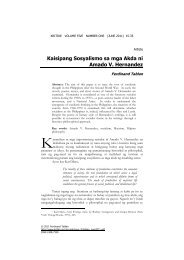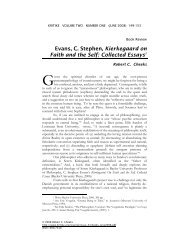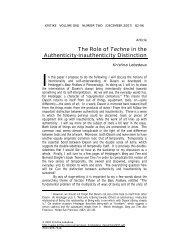The Paradox of Ipseity and Difference: Derrida's Deconstruction and ...
The Paradox of Ipseity and Difference: Derrida's Deconstruction and ...
The Paradox of Ipseity and Difference: Derrida's Deconstruction and ...
You also want an ePaper? Increase the reach of your titles
YUMPU automatically turns print PDFs into web optimized ePapers that Google loves.
36 THE PARADOX OF IPSEITY AND DIFFERENCE<br />
non-presence <strong>of</strong> the living present 15 or différance. Suffice to say that in<br />
communication, there is a certain form <strong>of</strong> absence in so far as it does not fully<br />
express the intention <strong>of</strong> the ego towards its other. Words only indicate presence,<br />
they are by themselves an indication that what is being signified is no longer<br />
present. When I listen to another, his lived experience is not present to me “in<br />
person,” 16 <strong>and</strong> it is in this way that we come to underst<strong>and</strong> that we are different<br />
from the Other, <strong>and</strong> that our familiarity with the Other’s ego is limited.<br />
This sense <strong>of</strong> absence <strong>and</strong> indeterminability is what Levinas would<br />
refer to as the infinity behind the Other 17 that provides us with the compelling<br />
justification to have an ethical responsibility <strong>of</strong> participating in the project <strong>of</strong> the<br />
other because the Other’s infinity impels us through our inability to know them<br />
as an inviting mystery for further epistemic investigation. We can find a<br />
different way <strong>of</strong> expressing this Levinasian notion <strong>of</strong> ethics in Derrida’s reading<br />
<strong>of</strong> Levinas, though Derrida disagrees with some major points in Totality <strong>and</strong><br />
Infinity, he nonetheless subscribes to the ethics <strong>of</strong> undecidability. One might<br />
consider Derrida’s ethics to have taken its root in Levinas’ notion <strong>of</strong> fecundity, 18<br />
wherein the undecidability or the indeterminate nature <strong>of</strong> the Other’s alterity is<br />
taken as an ethical framework <strong>of</strong> non-violence, whereas violence is considered as a<br />
manifestation <strong>of</strong> subjectivity towards the other. Derrida’s revision <strong>of</strong> this<br />
ethical system is done through the integration <strong>of</strong> différance as an epistemic<br />
transaction or a mode <strong>of</strong> calculation in which knowledge is tested so as to<br />
provide the possibility <strong>of</strong> subjectivity through a pre-ethical establishment <strong>of</strong><br />
Otherness in the ego <strong>of</strong> the subject. 19 This economy is, for Derrida, a necessary<br />
violence, so as to enable the I to surrender itself in the call <strong>of</strong> the face, which<br />
gives rise to an impoverishment <strong>of</strong> the ego to participate in the fecundity <strong>of</strong> the<br />
Other. Since the actual “murder” <strong>of</strong> the Other does not actually occur, but<br />
rather only within the subjectivity <strong>of</strong> the I, Derrida thinks that the entire fear <strong>of</strong><br />
reduction <strong>of</strong> the Other is a laughable “self-evident but criminal truism” which<br />
inevitably places ethics under the “heel <strong>of</strong> ontology.” 20<br />
In dealing with Levinas’ ethics, one becomes aware that Derrida still<br />
remains faithful to the priority <strong>of</strong> ontology as the fundamental mode <strong>of</strong><br />
knowing or talking about Being. Suffice to say, that Derrida finds Levinas<br />
inevitably going back to the priority <strong>of</strong> ontology despite his claim <strong>of</strong> endowing<br />
ethics such priority. 21 <strong>The</strong> ego then ought to be considered essentially as a<br />
15 Ibid., 37.<br />
16 Ibid., 38.<br />
17 Emmanuel Levinas, Totality <strong>and</strong> Infinity, trans. by A. Lingis, (Pennsylvania: Duquesne<br />
University Press, 1969), 213-214.<br />
18 Cf. Emmanuel Levinas, Time <strong>and</strong> the Other, trans. by R. Cohen, (Pennsylvania:<br />
Duquesne University Press, 1987), 90-94.<br />
19 Derrida, Writing <strong>and</strong> <strong>Difference</strong>, 128.<br />
20 Ibid., 135.<br />
21 Levinas would say: “History would not be the privileged plane where Being (Sein)<br />
disengaged from the particularism <strong>of</strong> points <strong>of</strong> view (with which reflection would still be<br />
affected) is manifested. If it claims to integrate myself <strong>and</strong> the other within an impersonal spirit<br />
this alleged integration is cruelty <strong>and</strong> injustice, that is, ignores the Other.” Levinas, Totality <strong>and</strong><br />
Infinity. p.52
















